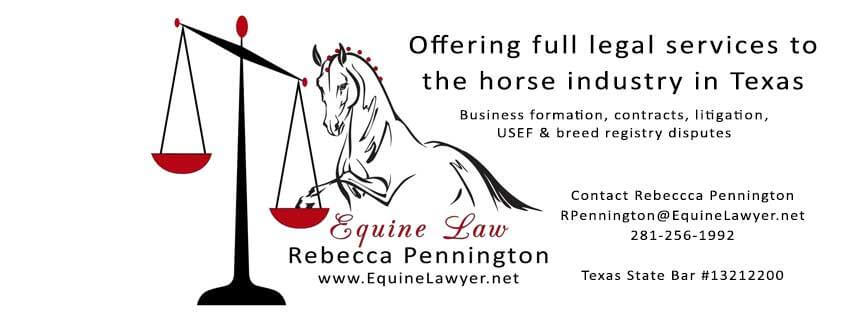
The vast majority of calls I receive in my equine law practice come from people with serious problems involving a verbal agreement. Some common examples include:
- arguments over representations made about the quality of a horse purchased,
- disputes regarding the terms of a training or sales agreement,
- disagreements with regard to who pays for what in a half-lease situation,
- battles between former friends over who gets the horse when the friendship goes sour,
- quarrels about returning a horse that was taken on trial,
- clashes over what is and is not included in the price of full board,
- fights over a trainer’s bill for showing a horse,
- and on and on.
Without a written agreement, the list of possible disputes is endless. And I guarantee you that such disputes will not be easily or quickly resolved. Often, litigation is the only way to do so, and lawsuits are always costly – much more costly than the initial expense of a well-drafted agreement.
What do you need to cover in the written agreement? That depends upon the issue, but in all agreements, make sure you have the names of the parties, the date of the agreement, a listing of what each party has promised to do (and by when and for how much) and the signatures of all parties. In addition, you should consider adding a paragraph saying that the parties agree to submit the matter to binding arbitration if a dispute arises. Arbitration is like an informal trial that is presided over by a mutually agreed upon person (the arbitrator) who is knowledgeable in the area at issue. Because it is more informal than a lawsuit, arbitration avoids expensive formal litigation in the courts. The decision of the arbitrator is enforceable in court, so it carries the same weight as a court judgment. Another important paragraph would be that the party who breaches the agreement must pay all the costs of enforcing the agreement, including attorneys’ fees. This latter can be a strong deterrent when one party is thinking of breaking the deal.
Do you need a lawyer to draft these agreements? Well, anything written down, no matter how informally (so long as it is signed by all parties) is better than nothing at all. But a lawyer can assist you in making sure that you don’t leave anything important out of the agreement and that the wording is clear. Terms like “unsound” and “live foal” can mean different things to different people. A lawyer can make sure that all such subjective terms are defined clearly, so there is no misunderstanding later.
Remember: no matter how well you know the other person or how good their reputation, you should always reduce your agreements to writing. This simple practice will avoid most of the disputes that arise in the horse world and will ensure that the matter goes as smoothly as possible. If horse folks would only put it in writing, I’d be out of business!
[Rebecca Pennington has been a trial lawyer in Houston for over 35 years and for 3 years was the Director of the Trial Advocacy Institute at the University of Houston Law Center. She is also a long time horse breeder and owner of Sonesta Farms in Cypress, Texas. Today she primarily practices equine law and hosts an equine law web site at www.EquineLawyer.net . Email her at RPennington@EquineLawyer.net ]
